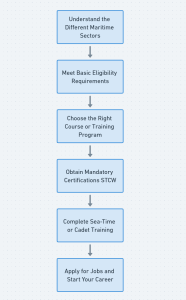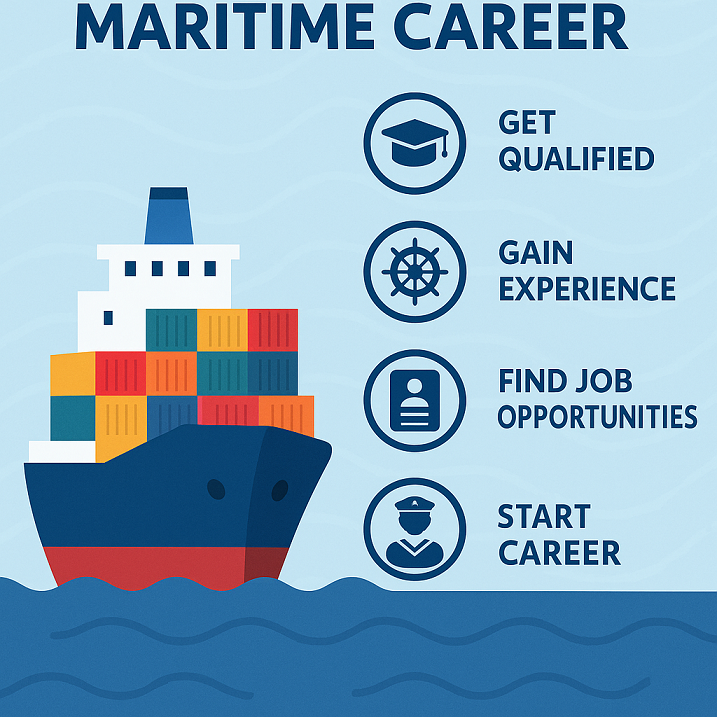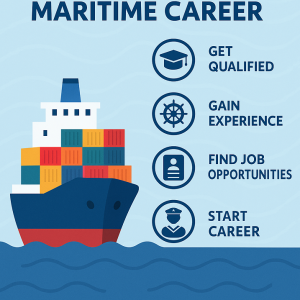Discover how to start a maritime career in 2025!
Learn about qualifications, top jobs, required training, and exciting career paths for aspiring seafarers.
Why a Maritime Career is a Smart Choice in 2025
Did you know that 90% of the world’s goods are transported by ships?
The maritime industry is a gateway to a global career, offering opportunities on cargo ships, cruise liners, offshore rigs, and in port operations. With increasing trade, green shipping initiatives, and global exploration, maritime careers are booming like never before.
In this 2025 guide, you’ll learn how to start your journey into the dynamic world of shipping — whether at sea or onshore — and what steps are needed to succeed.
————–
Why Choose a Career in the Maritime Industry?
The maritime industry offers unparalleled opportunities for those seeking adventure, financial stability, and professional growth. With the world’s economy heavily reliant on shipping and trade, maritime careers provide a gateway to global travel, allowing professionals to explore diverse cultures and destinations while working. One of the most attractive benefits is the potential for tax-free salaries in many countries, making it a lucrative field for seafarers and offshore workers. Beyond financial rewards, the industry presents diverse career paths, from engineering and navigation to logistics, offshore energy, and maritime law, ensuring there’s a role for every skillset.
Job security is another compelling reason to join this sector, as global trade, marine research, and logistics continuously drive demand for skilled maritime professionals. Additionally, working at sea fosters personal growth by developing leadership, resilience, and teamwork in dynamic, multicultural environments. The maritime industry serves as a vital bridge connecting nations, economies, and cultures, making it a fulfilling career choice for those who want to make a global impact.
-
Global Travel Opportunities
-
Tax-Free Salaries (in many countries)
-
Diverse Career Paths: Engineering, Navigation, Logistics, Offshore Energy, and more.
-
Job Security: Steady demand in global trade, logistics, and marine research.
-
Personal Growth: Leadership, resilience, teamwork, and international exposure.
🌍 The maritime sector is a bridge between nations, economies, and cultures.
————–
Step-by-Step: How to Start Your Maritime Career
Embarking on a maritime career begins with understanding the various sectors within the industry. Whether you’re drawn to the merchant navy, cruise industry, offshore energy, or maritime logistics, each sector offers unique roles such as deck officers, marine engineers, ROV operators, and port managers. Identifying the right fit based on your interests and strengths is the first step toward a successful career at sea.
Meeting basic eligibility requirements is crucial, including age (typically 16–18+), a high school diploma with a focus on science subjects, and passing a medical fitness exam. Proficiency in English is essential, as it is the primary language for international maritime communication. Once eligibility is confirmed, selecting the right training program is key—whether it’s nautical science for aspiring deck officers, marine engineering for technical roles, or specialized courses in maritime logistics and cruise hospitality.
Certifications are mandatory, with the STCW Basic Safety Training being a non-negotiable requirement. This covers firefighting, first aid, survival techniques, and safety protocols. Gaining hands-on experience through cadetships or internships is the next phase, allowing aspiring seafarers to accumulate sea-time and develop practical skills. Finally, job opportunities can be pursued through shipping companies, cruise lines, or maritime job fairs, launching a rewarding career on the high seas.
1. Understand the Different Maritime Sectors
Before diving in, identify which area matches your interests:
| Sector | Example Careers |
|---|---|
| Merchant Navy | Deck Officer, Marine Engineer |
| Cruise Industry | Hospitality Staff, Marine Electrician |
| Offshore Energy | ROV Operator, Offshore Engineer |
| Ports & Logistics | Port Operations Manager, Shipping Agent |
| Maritime Services | Marine Surveyor, Maritime Lawyer |
| Defense/Navy | Naval Architect, Military Officer |
2. Meet Basic Eligibility Requirements
- Age: Typically 16–18+ depending on country and program.
- Education: Senior secondary school certificate (high school diploma) with science subjects like mathematics and physics.
- Medical Fitness: Pass a seafarer’s medical examination (physical and eyesight tests).
- Language Skills: Good command of English (essential for international maritime communication).
🔎 Tip: Maritime academies and employers often require proof of fitness and academic readiness before acceptance.
3. Choose the Right Course or Training Program
| Pathway | Typical Programs |
|---|---|
| Deck Officer | Nautical Science, Maritime Navigation |
| Marine Engineer | Marine Engineering |
| Electro-Technical Officer (ETO) | Marine Electrical/Electronics |
| Hospitality/Cruise Careers | Cruise Hospitality Management |
| Port and Logistics Management | Maritime Logistics Courses |
Course Duration:
- Basic Certifications: 6 months – 1 year
- Degree Programs: 3–4 years
4. Obtain Mandatory Certifications (STCW)
Every seafarer must complete STCW Basic Safety Training, which includes:
- Personal Survival Techniques
- Fire Prevention and Firefighting
- Elementary First Aid
- Personal Safety and Social Responsibilities
🌊 No STCW certification = no legal right to work at sea!
5. Complete Sea-Time or Cadet Training
Real-world shipboard experience is essential.
You’ll need to:
- Complete cadetship or internships aboard ships.
- Accumulate sea service days required for licensing exams.
- Learn hands-on skills in navigation, engine operations, safety drills, and teamwork.
🚢 Cadetships often lead to full-time employment if you perform well.
6. Apply for Jobs and Start Your Career
Once qualified:
- Apply through shipping companies, cruise lines, offshore energy firms, or port authorities.
- Attend career fairs hosted by maritime academies.
- Build a LinkedIn profile highlighting maritime certifications and sea service.
Pro Tip:
Start with entry-level roles like Deck Cadet, Engine Cadet, Junior Engineer, or Hospitality Trainee to build experience.

FAQs: How to Start a Maritime Career
Q1: How long does it take to start a maritime career?
A: It can take 6 months to 4 years, depending on whether you pursue basic certification or a full maritime degree.
Q2: Is a degree required to work at sea?
A: No. Many entry-level seafarer roles only require STCW certification. However, higher-ranking officers usually need a maritime degree or equivalent qualifications.
Q3: What is the minimum age to work on a ship?
A: Generally 18 years old, although some countries allow cadet training starting from 16 with restrictions.
Q4: What is the best country to start a maritime career?
A: Countries with strong maritime traditions like the Philippines, India, Greece, Norway, UK, and the USA offer excellent opportunities.
Q5: Can I shift to shore-based jobs later?
A: Absolutely! After gaining sea experience, many professionals move into marine surveying, port management, shipbuilding, or maritime law.
————–
Future Trends in Maritime Careers (2024+)
-
Eco-Friendly Shipping: Demand for crew trained in LNG, hydrogen, and ammonia-fueled vessels.
-
Smart Ships: Remote operations and AI navigation systems creating new tech-focused jobs.
-
Offshore Renewables: Careers in wind farm support vessels, marine research, and subsea construction booming.
-
Diversity and Inclusion: Increasing focus on recruiting women and minorities into maritime roles.
🌱 The future of maritime careers is green, digital, and global.
————–
Final Thoughts: Set Sail Toward Your Future
Starting a maritime career is an adventurous and rewarding decision. Whether you dream of navigating ships across oceans, engineering massive engines, or managing bustling ports, there’s a path for you in this dynamic industry.
With the right qualifications, certifications, and passion, you can build a lifelong career traveling the world and contributing to global trade and sustainability.
🌊 Ready to set sail? Your maritime career journey starts now!
BONUS:
✅ Featured Snippet Paragraph Example to insert under Introduction:
“How to Start a Maritime Career: To begin a maritime career, you typically need a high school diploma, pass a medical examination, complete STCW Basic Safety Training, and enroll in a specialized maritime course such as Nautical Science or Marine Engineering. After gaining required sea service through cadetship, you can apply for seafaring jobs or licensing exams based on your chosen path.”
Further Reading and Resources
- Marine Ship Engineer Officer: A Complete Career & Training Guide
- How to Become a Ship Officer or Ship Engineer: A Step-by-Step Guide for Aspiring Seafarers
- Maritime Jobs: A Comprehensive Guide to Careers at Sea and Ashore
https://maritimeducation.com/maritime-jobs-a-comprehensive-guide-to-careers-at-sea-and-ashore/



A good article.I enjoyed reading it, thanks!